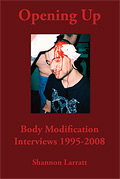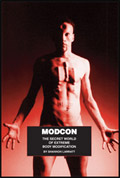A small (120 story) experience update has been posted. As always thank you to the writers and the review team. I really appreciate your help. If you'd like to join the review team and start deciding what experiences get posted to BME, just click the “HELP IAM” link on the main IAM index.
Thanks as well to Metalheart for being the rather odd cover model…
I know I should haven mentioned this earlier, but I think this it's important to note something about Martin Luther King. We hear a lot about his civil rights contributions and speeches, but you should be asking yourself why the four years leading up to his death are all but censored by the national media (more). To quote FAIR,
National news media have never come to terms with what Martin Luther King Jr. stood for during his final years. In the early 1960s, when King focused his challenge on legalized racial discrimination in the South, most major media were his allies ... but after passage of civil rights acts in 1964 and 1965, King began challenging the nation's fundamental priorities. He maintained that civil rights laws were empty without "human rights" -- including economic rights. For people too poor to eat at a restaurant or afford a decent home, King said, anti-discrimination laws were hollow.Noting that a majority of Americans below the poverty line were white, King developed a class perspective. He decried the huge income gaps between rich and poor, and called for "radical changes in the structure of our society" to redistribute wealth and power.
"True compassion," King declared, "is more than flinging a coin to a beggar; it comes to see that an edifice which produces beggars needs restructuring."
By 1967, King had also become the country's most prominent opponent of the Vietnam War, and a staunch critic of overall U.S. foreign policy, which he deemed militaristic. In his "Beyond Vietnam" speech delivered at New York's Riverside Church on April 4, 1967 -- a year to the day before he was murdered -- King called the United States "the greatest purveyor of violence in the world today."
In foreign policy, King also offered an economic critique, complaining about "capitalists of the West investing huge sums of money in Asia, Africa and South America, only to take the profits out with no concern for the social betterment of the countries."
You haven't heard the "Beyond Vietnam" speech on network news retrospectives, but national media heard it loud and clear back in 1967 -- and loudly denounced it. Time magazine called it "demagogic slander that sounded like a script for Radio Hanoi." The Washington Post patronized that "King has diminished his usefulness to his cause, his country, his people."
Puts his death into a very different context, doesn't it?



Post a Comment